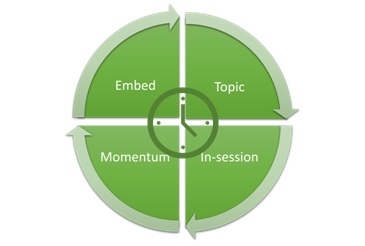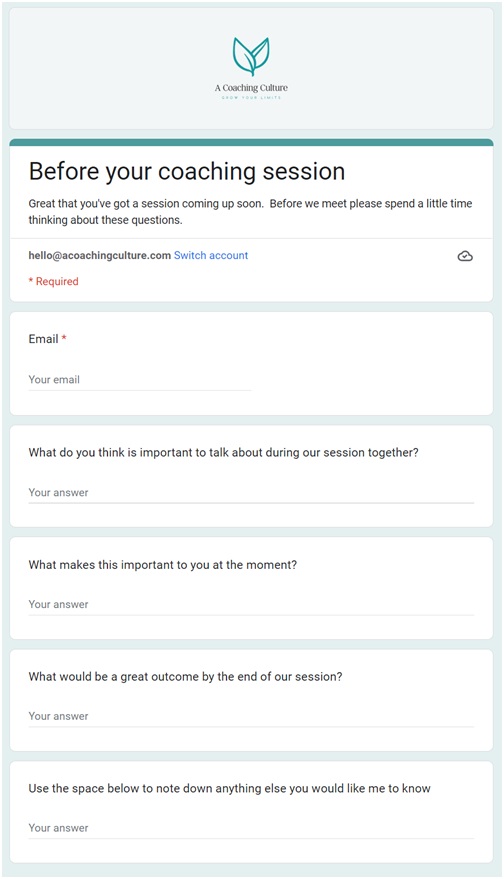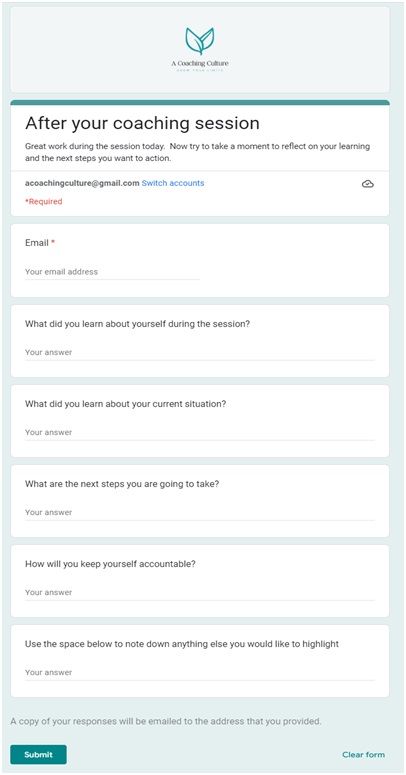A Coaching Model By Alison Mitchell, Leadership Coach, NETHERLANDS
The Gift of TIME
 As part of my professional work to support school leaders in developing and embedding a strengths-based coaching culture within their schools, I have had many discussions about the ideal time for a coaching session.
As part of my professional work to support school leaders in developing and embedding a strengths-based coaching culture within their schools, I have had many discussions about the ideal time for a coaching session.
This model has been developed whilst working with one such school. I worked with the school to develop time-efficient ways of getting the most out of a coaching relationship.
The school wanted to offer external coaching as one tool their staff could access for professional development. Because of the school scheduling and budget considerations, staff would be offered 30-minute sessions.
Whilst I adopt the GROW model when working with school staff, I was looking for a way to maximize the contact time for both myself as a coach, and the educators.
I call my method (or model) “The gift of TIME”
The Coaching Model the Gift of TIME
There are four specific sections to this model. The first and the last parts take place outside of the session. The second and third parts are in the session.
Part 1 – Topic Clarity – Pre-session Thinking
The first part of my model is a form that is sent to the client to think about the topic for the session. I have found that by the client thinking about their topic before our session, we are able to clarify the coaching agreement early on in the session. The answers to the questions sent are reviewed before the session, but there will be further exploration and clarification of the outcome at the beginning of our time together.
An example of the form is shown here –

Part 2 – In Session
The coaching session itself generally follows the GROW model.
Goal – I start with a review of the pre-session form. Exploration and clarification of the outcome at this stage are very important as the client may have a different goal for the session or the work they have done before the session may need additional exploration.
Reality – We will explore the current reality. The following questions may be useful at this stage.
- What have you done about this so far?
- What results did that produce?
- What is missing in the situation?
- What do you have that you’re not using?
- What is holding you back?
Options – Once there is clarity about the goal and the current reality, the client will be invited to explore their options, using the resources they have, but also exploring more visionary thinking. Questions might include –
- What are your options?
- How have you overcome this/ a similar situation before?
- What could you do differently?
- Who do you know who has encountered a similar situation?
- If anything was possible what would you do?
- And my favorite question….What else?
Will – After the client has explored options, they will decide what they will do next. They will be invited to think about their own learning during the session, how this can be applied to the situation, and how it could be applied to other situations. This then leads to the next section of my coaching model – momentum.
Part 3 – Momentum (In-Session)
Once I have guided the client through the GROW process, at this stage I am looking to partner with the client to build momentum, before closing the session. At this point, we would look to book the next session, explain the importance of the post-session reflection, and check in on motivation
On a scale of 1 -10 how committed /motivated are you to doing it?
How can you keep the momentum going?
The aim is to leave the client feeling motivated to take the next steps.
Part 4 – Embed (Post-session Reflection)
The post-session reflection outside of the coaching session is an important part of the process to enable the client to embed the learning that he/she has had within the coaching session. An example of the form is below. As a coach, I would usually send a voice message between sessions to check in.

The cycle then starts again with the client receiving the pre-session form 5 days before the coaching session.
Evaluation
Initial work using this method has been successful. Feedback from clients who have used the pre and post-session forms has been positive, saying it has allowed them to focus, they feel there is more accountability if they have made some notes and the form responses (which are automatically emailed to them) are good to look back on.
From the point of view of the coach, whilst I still want exploration and clarity in the coaching agreement, I feel that clients are coming to the sessions more prepared. It has also been interesting to see how aligned my post-session notes are with that of my clients.
A Final Note About Ethics and Privacy
As with all aspects of the coaching process, the pre and post-session forms are optional for clients, and the coaching sessions would work without them. The initial coaching contract states that the data on the forms is confidential and held throughout the coaching relationship. The data, as with other notes, is deleted/destroyed within 1 month of the end of the coaching relationship.
Learn How to Create Your Own Coaching Model
Your Coaching Model reflects your values,
philosophies, and beliefs and must communicate who you will coach
and the problems you will solve. Read more about creating your coaching model
References
Aguilar, E. (2013). The Art of Coaching: Effective Strategies for School Transformation. San Francisco, CA: Jossey-Bass.
The Grow Model › Coaching for Performance | Performance Consultants International Coaching for Performance, 2020, Accessed 31 October 2022.
